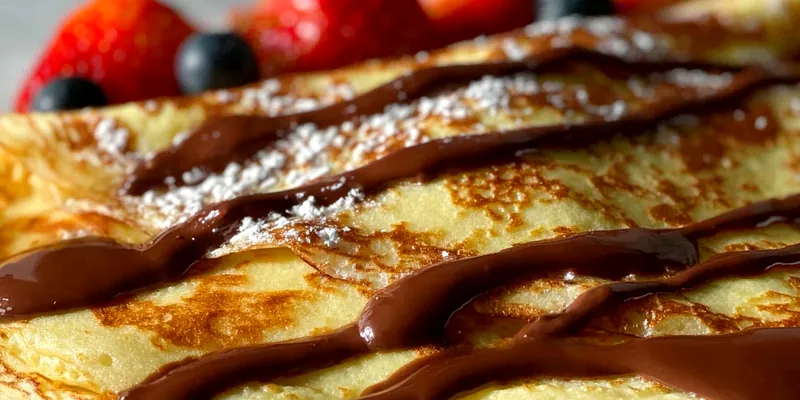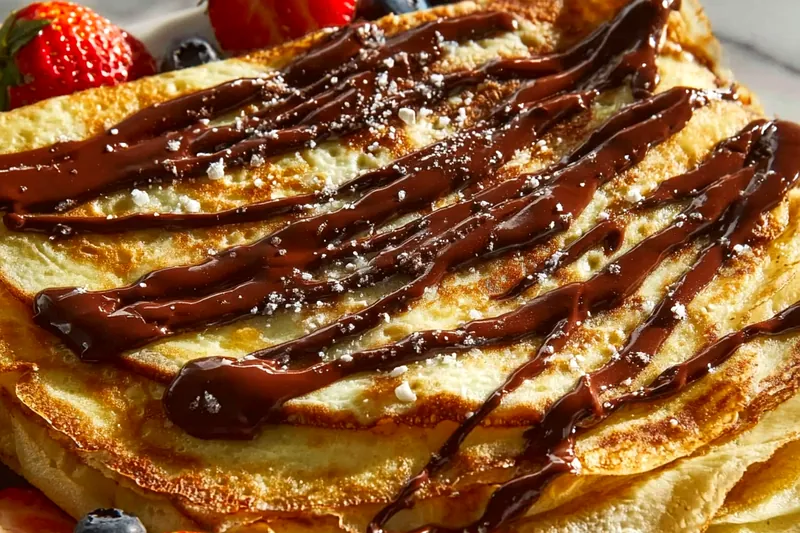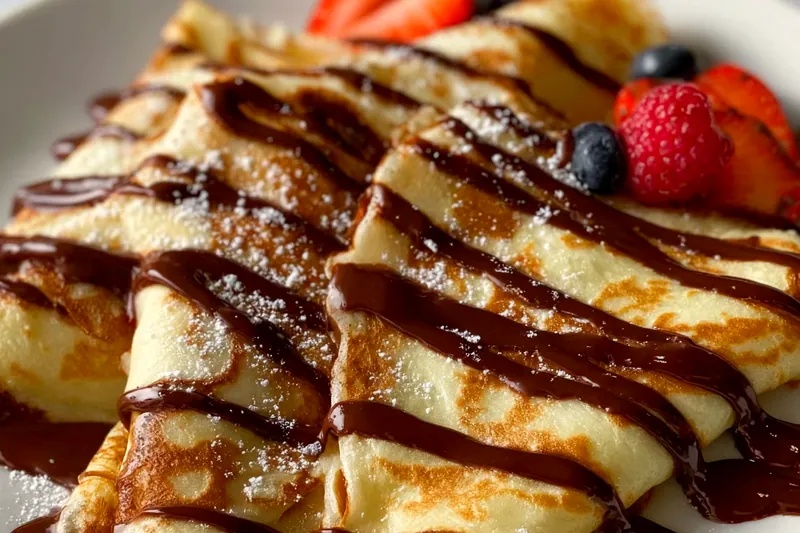Portion of Two Folded Crepes
Classic French crepes with delicate, paper-thin texture. Perfect for breakfast, dessert, or light meals with sweet or savory fillings.

The Art of Perfect Crepe Batter
Creating the perfect crepe begins with achieving the ideal batter consistency. The mixture should be smooth and free of lumps, coating a spoon but still pouring easily. Resting the batter allows the flour to fully hydrate and creates more tender crepes.
Temperature control is crucial for success. The pan should be hot enough to set the batter quickly but not so hot that it burns before the crepe can be properly spread. A properly heated pan will allow the batter to flow smoothly across the surface.
💡 Professional Tip
Let the batter rest for at least 30 minutes before cooking. This allows the gluten to relax and the flour to fully hydrate, resulting in more tender, flexible crepes.
Frequently Asked Questions
Crepes may tear if they're overcooked, the batter is too thick, or they haven't rested properly. Ensure the batter flows easily and cook just until set.
Yes, crepe batter can be made up to 24 hours ahead and stored in the refrigerator. Stir gently before using and add a little milk if it has thickened.
A non-stick 8-9 inch pan with low sides works best. Traditional crepe pans are ideal, but any good non-stick skillet will work well.
Crepes should be thin enough to see through slightly. Use just enough batter to coat the bottom of the pan when swirled - about 1/4 cup for an 8-inch pan.
Yes, layer cooled crepes between parchment paper and freeze for up to 2 months. Thaw at room temperature or warm gently in a pan.
Sweet options include jam, Nutella, fresh fruit, or lemon and sugar. For savory, try ham and cheese, mushrooms, or spinach and ricotta.
The first crepe often sticks as the pan temperature isn't quite right yet. Consider it a test crepe to gauge heat and adjust accordingly.
Use a well-seasoned non-stick pan, ensure proper temperature, and lightly butter the pan between each crepe. Don't use too much butter as it can make crepes greasy.
Recipe Troubleshooting Guide
Lumpy Batter
Problem: Batter has lumps that won't blend out
Solution: Strain the batter through a fine-mesh sieve, or blend longer. Start with liquid ingredients before adding flour next time.
Thick, Heavy Crepes
Problem: Crepes are too thick and cake-like
Solution: Thin the batter with milk or water. Use less batter per crepe and swirl quickly to spread thinly.
Crepes Sticking
Problem: Crepes stick to the pan and tear
Prevention: Ensure pan is properly heated and lightly greased. Season non-stick pans properly and check that batter isn't too thin.
Uneven Cooking
Problem: Crepes cook unevenly with thick and thin spots
Recovery: Swirl batter immediately after pouring. Ensure pan is level and heat is evenly distributed. Practice the swirling motion.
Rubbery Texture
Problem: Crepes are tough and rubbery
Prevention: Don't overmix batter, ensure it has rested, and avoid overcooking. Lower heat slightly if cooking too quickly.
Flavor Balance Issues
Too Sweet: Add a pinch more vanilla or a tablespoon of sugar to the batter
Too Salty: Reduce salt slightly and add a touch more sugar to balance
Bland: Add vanilla extract, a splash of rum, or lemon zest to enhance flavor

Essential Crepe Ingredients
The beauty of crepes lies in their simplicity, requiring just a few basic ingredients that most home cooks have on hand. Fresh eggs provide structure and richness, while whole milk creates the proper consistency and flavor. The flour should be all-purpose for the right balance of protein.
Butter adds richness and helps prevent sticking, while a touch of sugar and vanilla enhances flavor without making the crepes overly sweet. Salt balances the flavors and strengthens the protein structure for more flexible crepes.
Essential Ingredient Notes
- Eggs: Use room temperature eggs for better mixing. Fresh eggs create more stable batters and contribute to the crepes' golden color.
- Milk: Whole milk provides the best flavor and texture. For lighter crepes, you can substitute up to half the milk with water.
- Flour: All-purpose flour works perfectly. Avoid bread flour as it contains too much protein and can make crepes tough.

Mastering the Crepe Technique
The key to perfect crepes is the swirling technique. Pour the batter into the center of the hot pan and immediately lift and tilt the pan in a circular motion to spread the batter evenly across the surface. This creates the characteristic thin, even texture.
Timing is everything when cooking crepes. The first side should cook until the edges are set and lightly golden, typically 1-2 minutes. The second side cooks much faster, usually just 30-60 seconds, as it's primarily for color and to ensure the crepe is fully set.
The Perfect Swirl
Pour batter into the center and immediately rotate the pan in a smooth, continuous motion. The batter should flow to cover the entire bottom surface in one fluid movement.
Portion of Two Folded Crepes
📋 Ingredients
For the Crepe Batter
- Butter for greasing panEssential for preventing sticking
- Powdered sugar for dustingClassic finishing touch
- Fresh berries for servingAdds color and freshness
- Lemon wedges for servingTraditional French accompaniment
- Jam or Nutella for fillingPopular sweet filling options
- Optional: 15ml rum or cognacAdds sophisticated flavor
For Serving
- 250ml whole milkCreates proper consistency and richness
- 125g all-purpose flourPerfect protein content for tender crepes
- 2 large eggsProvides structure and golden color
- 30g melted butterAdds richness and prevents sticking
- 15g granulated sugarBalances flavor without oversweetening
- 1/4 tsp saltEnhances flavor and strengthens structure
- 15ml vanilla extractAdds aromatic sweetness
Instructions
Make Batter
In a blender or mixing bowl, combine flour, eggs, milk, melted butter, sugar, salt, and vanilla. Blend until completely smooth. Let batter rest for 30 minutes at room temperature.
Check Consistency
After resting, check batter consistency. It should coat a spoon but still pour easily. Add 1-2 tablespoons of water or milk if too thick.
Heat Pan
Heat a 8-9 inch non-stick pan or crepe pan over medium heat. Lightly butter the pan using a paper towel to spread evenly.
Cook First Crepe
Pour 1/4 cup batter into center of pan, immediately swirling to spread thinly across bottom. Cook 1-2 minutes until edges are set and lightly golden. Flip carefully and cook 30-60 seconds more.
Fold and Serve
Transfer crepe to plate. Fold in half, then in half again to create triangle quarters. Repeat with second crepe. Dust with powdered sugar and serve immediately with desired fillings.
Recipe Notes & Tips
Storage
Cooked crepes can be stored in the refrigerator for up to 3 days with parchment paper between layers. Reheat gently in a warm pan before serving.
Serving Suggestions
Serve with powdered sugar, fresh fruit, jam, or Nutella for sweet versions. For savory, try ham and cheese, mushrooms, or spinach and ricotta.
Variations
Add lemon zest to the batter for citrus flavor, or substitute some milk with orange juice. For chocolate crepes, replace 2 tablespoons flour with cocoa powder.
